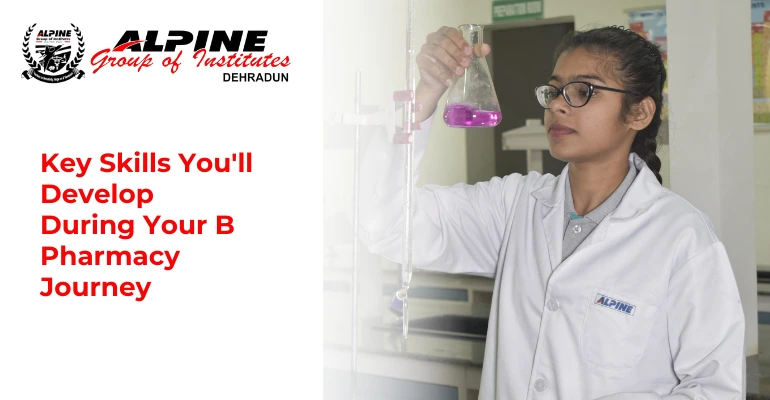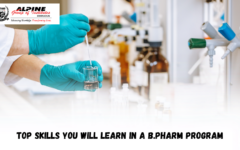Key Skills You’ll Develop During Your B Pharmacy Journey
2024-12-18 8:30Key Skills You’ll Develop During Your B Pharmacy Journey
The journey through a B Pharmacy program is not just about learning the technical aspects of drug formulation and clinical applications. It’s also about developing a well-rounded skill set that will make you a valuable asset to the healthcare community. These skills will serve you throughout your career, whether you’re working in pharmaceutical research, clinical pharmacy, or community pharmacy. Here are some of the key skills you’ll develop during your B Pharmacy journey:
1. Pharmaceutical Knowledge
A deep understanding of pharmaceutical sciences is at the heart of your B Pharmacy education. You will learn the essentials of pharmacology, medicinal chemistry, pharmaceutics, and more. This foundational knowledge equips you to:
- Understand the chemical composition and structure of drugs and how they affect the body.
- Identify the therapeutic uses, side effects, and drug interactions.
- Classify medications based on their mechanism of action, chemical properties, and therapeutic class.
- Develop an understanding of drug regulations and safety protocols.
This knowledge is critical for advising patients, recommending appropriate medications, and working with healthcare teams to ensure effective patient care.
2. Critical Thinking and Problem-Solving
Pharmacists are not just dispensers of medication; they are critical thinkers who solve complex problems related to patient health. Throughout your B Pharmacy course, you’ll develop:
- The ability to analyze complex clinical cases, recognizing when drug therapies need to be adjusted for a patient’s specific needs.
- Problem-solving skills to recommend drug alternatives, manage drug interactions, or identify potential issues related to medication therapy.
- The ability to assess pharmacokinetics (how the body processes drugs) and pharmacodynamics (how drugs affect the body) to optimize treatment plans.
- Evaluating research findings to make evidence-based decisions in clinical practice.
This critical thinking approach will enable you to provide safe, effective, and personalized care to your future patients.
3. Communication Skills
Effective communication is essential for any healthcare professional, and as a pharmacist, you will need to communicate clearly and confidently with patients, doctors, and other healthcare providers. Here’s how the B Pharmacy program develops your communication skills:
- Patient Counseling: You will learn to explain medication regimens, dosages, and potential side effects to patients in an easy-to-understand manner.
- Collaborating with Healthcare Teams: Pharmacists work as part of a larger healthcare team. You will practice collaborating with doctors, nurses, and other professionals to develop effective treatment plans for patients.
- Interpersonal Communication: Developing empathy and active listening is key to understanding a patient’s needs and addressing their concerns about their medications or treatments.
- Clear and Concise Documentation: You’ll also develop the ability to document patient information, prescriptions, and treatment plans in a clear, organized, and legally compliant manner.
Strong communication will help you build trust with patients and colleagues, making you a more effective healthcare provider.
4. Attention to Detail
Pharmacy requires precision and attention to detail because even the smallest errors can have serious consequences. Throughout your B Pharmacy education, you’ll refine the following skills:
- Accurate Medication Dispensing: You’ll develop the ability to carefully check prescriptions for accuracy, ensuring that patients receive the right medication in the correct dosage.
- Monitoring Drug Interactions: You’ll learn to identify and prevent harmful drug interactions that could compromise patient safety.
- Quality Control: In the pharmaceutical industry, attention to detail is crucial when it comes to manufacturing, packaging, and labeling drugs, ensuring they meet high standards of safety and efficacy.
This skill will be critical whether you’re preparing prescriptions in a community pharmacy, working in a hospital setting, or managing drug inventories in the pharmaceutical industry.
5. Time Management and Organization
A career in pharmacy involves managing multiple tasks at once, whether it’s preparing medications, counseling patients, or managing inventory. The B Pharmacy program teaches you how to:
- Prioritize tasks effectively, especially when working under pressure in a fast-paced setting.
- Balance theory and practical work by organizing study schedules, assignments, and internship hours.
- Coordinate responsibilities: Whether in a pharmacy or research lab, you’ll learn to juggle different roles and manage your time efficiently to meet deadlines and provide excellent care.
Good time management will ensure that you can fulfill your professional obligations while maintaining work-life balance.
6. Research and Analytical Skills
Research is an essential component of pharmacy education, and your B Pharmacy journey will foster a research-oriented mindset. These skills include:
- Evaluating Scientific Literature: You will learn how to analyze and interpret research papers, clinical trials, and drug studies to stay informed about the latest pharmaceutical advancements.
- Conducting Experiments and Clinical Trials: Some programs will require you to conduct your own research or work alongside experts, contributing to the development of new drug therapies.
- Data Analysis: Learning to interpret pharmaceutical data, analyze trends, and apply findings to real-world patient care.
These research and analytical skills will be vital if you choose to pursue a career in pharmaceutical research or clinical trials.
7. Ethical and Professional Practice
As a pharmacist, you will encounter situations that require you to make ethical decisions, often involving patient care, medication distribution, and public health. The B Pharmacy program instills:
- Understanding Pharmacy Ethics: You’ll study the ethical principles surrounding patient confidentiality, informed consent, and patient autonomy.
- Adhering to Legal Guidelines: You’ll also gain an understanding of pharmaceutical laws and regulations that govern drug dispensation, marketing, and clinical practice.
- Professionalism in Healthcare: You’ll learn how to maintain professionalism, integrity, and trust in your interactions with patients and healthcare colleagues.
Being aware of the ethical and legal responsibilities that come with being a pharmacist will help you provide the highest standard of care to your patients.
8. Clinical Skills
In later years of the B Pharmacy program, particularly if you choose a clinical pharmacy track, you’ll develop hands-on clinical skills that are essential for direct patient care, such as:
- Medication Therapy Management (MTM): You’ll be trained to assess patients’ medication regimens, ensuring the drugs they are taking are appropriate and effective.
- Pharmacokinetic and Pharmacodynamic Calculations: Understanding how drugs interact with the body and tailoring treatments accordingly is crucial in managing complex patient cases.
- Clinical Decision-Making: Learning to assess patient conditions, collaborate with medical teams, and make informed decisions to optimize treatment outcomes.
Clinical skills are critical for any pharmacist working in a hospital, clinic, or specialized healthcare setting.
9. Leadership and Teamwork
Whether you’re managing a pharmacy team, working as part of a hospital unit, or leading a research project, leadership and teamwork skills are essential. The B Pharmacy program helps develop:
- Leadership Skills: You may be asked to manage a small team of pharmacy assistants or guide less experienced students during internships, giving you valuable leadership experience.
- Teamwork and Collaboration: In both the pharmaceutical industry and clinical settings, collaboration with multidisciplinary teams will be essential for achieving optimal patient outcomes.
These leadership and teamwork skills will help you navigate the dynamic and collaborative environment of healthcare.
Conclusion
The B Pharmacy journey is about more than just mastering the science of medications; it’s about developing a diverse skill set that prepares you for the many challenges you will face in the pharmacy profession. From scientific knowledge and technical expertise to critical thinking, communication, and leadership, the skills you acquire during your education will shape your ability to provide high-quality patient care and make a meaningful impact on public health.
As you progress through the B Pharmacy program, you will build a strong foundation that will serve you well in a variety of career paths—whether it’s in community pharmacy, clinical practice, research, or industry. These key skills will empower you to not only excel in your career but also contribute to the advancement of healthcare as a whole.







